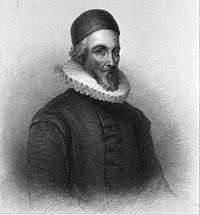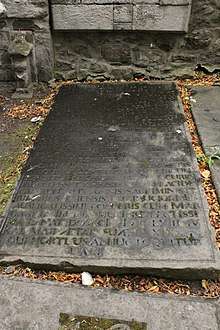Andrew Cant (minister)
Rev Andrew Cant (1590–1663) was a Presbyterian minister and leader of the Scottish Covenanters.

Life

About 1623 the people of Edinburgh called him to be their minister, but he was rejected by James I. Ten years later he was minister of Pitsligo in Aberdeenshire, a charge which he left in 1638 for that of Newbattle in Midlothian. In July of that year he went with other commissioners to Aberdeen in the vain attempt to induce the university and the presbytery of that city to subscribe the National Covenant, and in the following November sat in the general assembly at Glasgow which abolished episcopacy in Scotland.[1] In 1638 Cant was minister of Pitsligo in Aberdeenshire.[2]
In 1640 he was chaplain to the Scottish army and then settled as minister in Aberdeen. Though a staunch Covenanter, he was a zealous Royalist, preaching before Charles I in Edinburgh, and stoutly advocating the restoration of the monarchy in the time of the Commonwealth. Cant's frequent and bitter verbal attacks on various members of his congregation led in 1661 to complaints laid before the magistrates, in consequence of which he resigned his charge.
He died in Aberdeen on 27 April 1663, He is buried in the graveyard of the Kirk of St Nicholas on Union Street. The flat slab marking is grave lies midway along the west wall.[3]
Family
He was married to Margaret Irvin.[4]
His son Andrew was principal of Edinburgh University (1675–1685).[1]
References
-

- "Andrew Cant". Electric Scotland. Retrieved 19 September 2015.
- Grave of Andrew Cant, St Nicholas Churchyard, Aberdeen
- Grave of Andrew Cant, Kirk of St Nicholas
| Academic offices | ||
|---|---|---|
| Preceded by Unknown |
Rector of King's College, Aberdeen 1651 – ? |
Succeeded by Unknown |